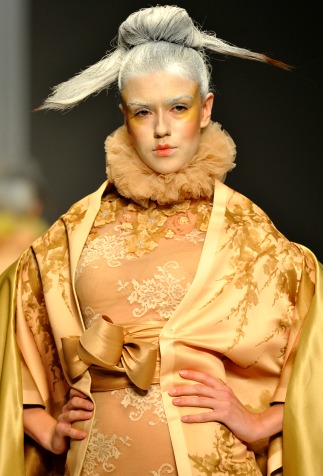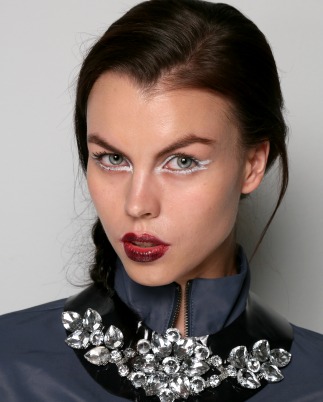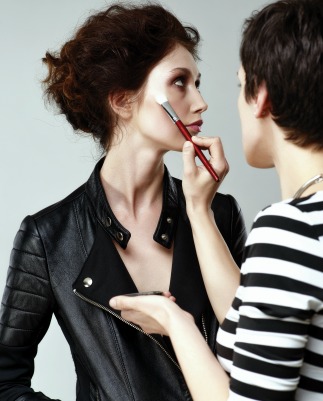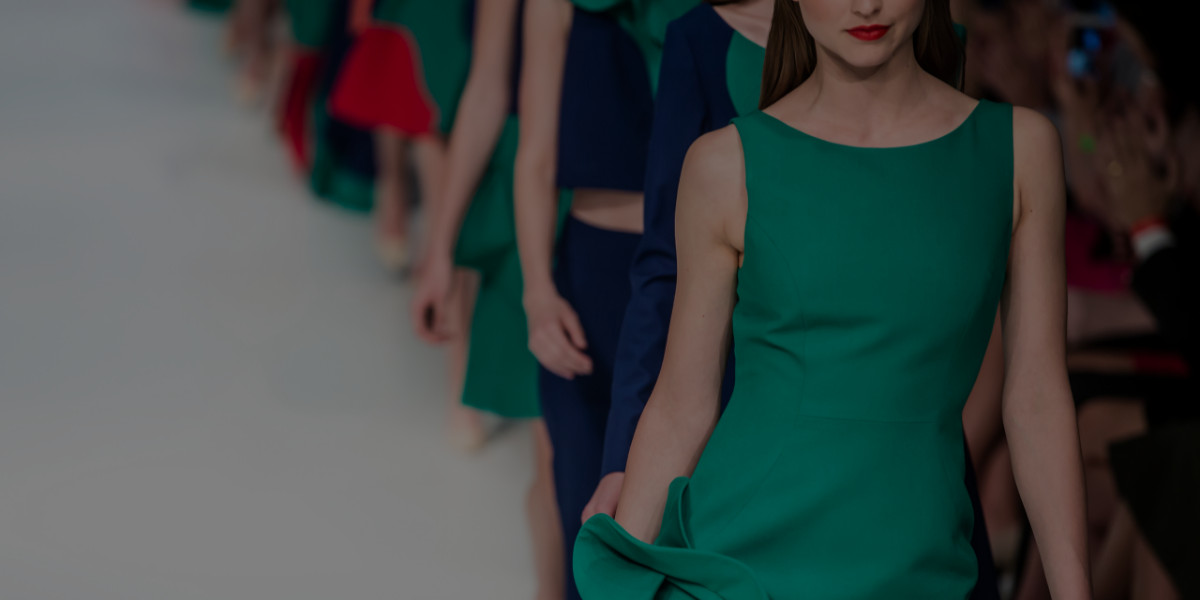Read up on Part Two of the Career Series: The Freelance Makeup Artist!
When you took our dream client quiz, did you score the runway client? (And if you haven’t taken the quiz yet, come on! What are you waiting for?) The constant action, the creativity, the artistic challenge… Runway work isn’t for everyone, but for some makeup artists, it’s a big-time career goal.
A Day in the Life
A makeup artist who’s made it to the high-end shows will find most of their runway work during the “Big Four” fashion weeks: New York, London, Milan, and Paris. Each city holds two fashion weeks a year. You can also look out for specialized fashion shows and fashion weeks, like Bridal Fashion Week or Paris’s haute couture shows.
If you’re the lead makeup artist, you’ll meet with the designer a few days before the show for a test. They’ll fill you in on the show’s story and let you take a look at fabric swatches or pieces from the collection. Then you’ll create a look on the test model until you and the designer settle on the perfect fit.

On the day of the show, you’ll arrive early (even earlier than call time, that is) to get your station set up. After a last-minute meeting with the designer’s staff to confirm how many models you’ll be working on and how much time you’ll have, things start getting busy. As the lead artist, you’ll be doing the makeup for a handful of models yourself, plus supervising your assistants and your team. Then add in last-minute changes, models showing up late, beauty editors and bloggers trying to get a quick interview… you’ll definitely have your hands full!
And this isn’t a one-time deal. During whatever fashion week you’re doing, you might be doing multiple tests and shows a day. Even if you’re not the lead artist, your schedule can be jam-packed.
While many shows stick to the basics in their beauty, some designers like to go over the top. Did you see the incredible masks Pat McGrath created for Givenchy this year? Or the gold leaf covering models’ faces for Rick Owens’ Fall/Winter 2015 collection? Those kinds of intensive looks might have you getting up extra-early for several hours of complicated makeup application—or working long, late hours the night before a show to come up with a special beauty prop.
And what to do with the rest of your year? Well, you can carry on your love of fashion year-round by grabbing editorial work for ads and magazines. Many runway artists work for big-name makeup brands like MAC, NARS, or Sephora, in which case you can expect to be landing other high-profile jobs throughout the year.

Personality Profile
Okay, in case you didn’t pick up on it already, runway makeup can be stressful stuff. Long hours, tight deadlines, late models, last-minute changes—if you can’t deal with a fast-paced work environment, runway makeup isn’t the career for you!
It’s also a matter of people skills. You’ll be spending a lot of time with your team and the people backstage, and just like you, they’re feeling the pressure. Keeping your cool and staying polite, even when things seem to be falling apart, makes people want to keep working with you. If you’re the lead artist, you’ve got to hit a tricky balance: staying calm when things go wrong, but making sure they get fixed all the same.
Many people think runway makeup is all about creativity. That’s definitely true, but not always in the way you’d expect. A designer’s aesthetic isn’t always your aesthetic, and many designers want their makeup to stay pretty basic. Recognizing a collection’s style and creating an appropriate, original look for it are major skills in this industry!
And—need we say it—a makeup artistry career behind-the-scenes on the runway takes dedication. If you’re thinking runway makeup artistry sounds like a competitive field, you’re definitely right. You need to have the grit (and the guts) to keep going, even when (and it’s definitely when, not if) you face rejection.

Getting There
You guessed it: no one starts out their makeup artistry career as a runway makeup artist! If you’ve got your heart set on the runway, it’ll take experience, hard work, and connections with the right people. Don’t despair, though: building your network isn’t just a matter of chance.
First, you’ll want to get the background. A course or degree that includes material on high fashion, runway, and editorial makeup is the perfect place to start, like our Master Makeup Artistry course. Even though you probably won’t find jobs creating those looks right away, practice those skills on friends and models to keep your makeup muscles in shape. Organizing a creative styled shoot lets you practice your looks and helps you build your runway portfolio.
Make sure you’re keeping an eye on makeup trends, too. Runway work is where those trends get set. Before you can start creating your own trends, you need to know what’s already in style!

Runway makeup artistry is definitely a “work your way up” kind of business, so don’t let starting small discourage you. Working small-scale shows or looking for jobs as an assistant with other makeup artists is the best way to start building up your network. Plus, the runway experience it gives you lets you know what to expect when you start taking on bigger jobs.
As Nathan told us, designers tend to go for makeup artists they already know, often from look books or ad campaigns (or, in Nathan’s case, a reality TV show!) so editorial work is a good place to start. The relationship between a designer and a makeup artist is all about trust—and a designer who respects your work and trusts your professional skills is going to keep coming back to you!
Is it for me?
The Pros:
- Opportunity to set trends and get your work recognized
- Fast-paced workplace keeps things interesting
- Helps establish you as a leading makeup artist
- Lots of artistic and creative challenges
- Easy to combine with other makeup work, like editorial
- Often goes hand-in-hand with work for a big-name company
- Lets you create totally unique, original looks
The Cons:
- Difficult to break into the industry right away
- Work environment can be stressful
- Lots of pressure to do well in high-profile shows
- Seasonal employment
- Tons of competition
- Long hours
Sure, it can be a tough path to get there, but if you love high fashion and you’re passionate about cutting-edge beauty it’s totally worth it! Just remember—in such a competitive industry, rejection is more than just a possibility. Missing out on a job you’ve been dreaming of can be frustrating, but you can’t let it discourage you. Get some more practice, build your network, and keep trying!
Ready for Part Four? Find out about the career of a movie makeup artist!

I ended up getting photoshoot makeup as my quiz answer. So be interesting to see the day in the life of someone in that area 🙂